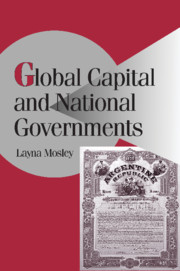Book contents
- Frontmatter
- Contents
- List of Figures and Tables
- Acknowledgments
- 1 NATIONAL GOVERNMENTS AND GLOBAL CAPITAL: A RECASTING
- 2 FINANCIAL MARKET INFLUENCE ON GOVERNMENT POLICY: THEORY AND HYPOTHESES
- 3 FINANCIAL MARKET INFLUENCE IN DEVELOPED NATIONS: AN EMPIRICAL ASSESSMENT
- 4 FINANCIAL MARKET–GOVERNMENT RELATIONS IN EMERGING MARKETS
- 5 POLITICS MEETS MARKETS: DOMESTIC RESPONSES TO FINANCIAL MARKET PRESSURES
- 6 ALTERNATIVE DOMESTIC RESPONSES: CHANGES TO FINANCIAL MARKET–GOVERNMENT RELATIONS
- 7 HISTORY REPEATING ITSELF? FINANCIAL MARKETS AND NATIONAL GOVERNMENT POLICIES BEFORE THE FIRST WORLD WAR
- 8 FINANCIAL MARKET–GOVERNMENT RELATIONS IN THE TWENTY-FIRST CENTURY
- APPENDIX 2.1 FINANCIAL MARKET INTERVIEWS
- APPENDIX 3.1 DATA DEFINITIONS AND SOURCES
- APPENDIX 3.2 FULL RESULTS FOR MACROINDICATORS MODEL
- APPENDIX 4.1 THE COMPONENTS OF THE SDDS
- APPENDIX 4.2 RATING AGENCY METHODOLOGIES
- APPENDIX 4.3 RATING AGENCY OUTCOMES, 1997
- APPENDIX 6.1 NATIONS IN CAPITAL CONTROLS DATA SET
- References
- Index
- Titles in the series
8 - FINANCIAL MARKET–GOVERNMENT RELATIONS IN THE TWENTY-FIRST CENTURY
Published online by Cambridge University Press: 14 January 2010
- Frontmatter
- Contents
- List of Figures and Tables
- Acknowledgments
- 1 NATIONAL GOVERNMENTS AND GLOBAL CAPITAL: A RECASTING
- 2 FINANCIAL MARKET INFLUENCE ON GOVERNMENT POLICY: THEORY AND HYPOTHESES
- 3 FINANCIAL MARKET INFLUENCE IN DEVELOPED NATIONS: AN EMPIRICAL ASSESSMENT
- 4 FINANCIAL MARKET–GOVERNMENT RELATIONS IN EMERGING MARKETS
- 5 POLITICS MEETS MARKETS: DOMESTIC RESPONSES TO FINANCIAL MARKET PRESSURES
- 6 ALTERNATIVE DOMESTIC RESPONSES: CHANGES TO FINANCIAL MARKET–GOVERNMENT RELATIONS
- 7 HISTORY REPEATING ITSELF? FINANCIAL MARKETS AND NATIONAL GOVERNMENT POLICIES BEFORE THE FIRST WORLD WAR
- 8 FINANCIAL MARKET–GOVERNMENT RELATIONS IN THE TWENTY-FIRST CENTURY
- APPENDIX 2.1 FINANCIAL MARKET INTERVIEWS
- APPENDIX 3.1 DATA DEFINITIONS AND SOURCES
- APPENDIX 3.2 FULL RESULTS FOR MACROINDICATORS MODEL
- APPENDIX 4.1 THE COMPONENTS OF THE SDDS
- APPENDIX 4.2 RATING AGENCY METHODOLOGIES
- APPENDIX 4.3 RATING AGENCY OUTCOMES, 1997
- APPENDIX 6.1 NATIONS IN CAPITAL CONTROLS DATA SET
- References
- Index
- Titles in the series
Summary
The government of an internationally integrated economy is far from powerless. It is merely somewhat constrained.
The final years of the twentieth century witnessed a dramatic rise in grass-roots protests against the IMF, the WTO, the G-7, and the Organization of American States (OAS), among others. The common threat binding together these disparate protest actions was accountability: to what extent could intergovernmental organizations be held responsible by member governments and by individual citizens? Had the democratic process in these institutions become so indirect as to be meaningless? Did the focus on efficiency and effectiveness in international political and economic relations result in a failure to attend to issues of equity and representation? In many ways, this book addresses the same theme of accountability: to what extent, and via what mechanisms, do contemporary governments retain policymaking autonomy vis-à-vis international financial markets? Has the locus of government policymaking shifted from cabinets and legislatures to central banks and bond markets? Or do governments and domestic groups remain the ultimate arbiters of national policy choices? As many scholars of international institutions would point out, and as I demonstrate, governments' freedom of action is, in some ways, reduced by international involvement but remains intact, or is even expanded, in others.
Key Findings
This book contributes to a wide literature on economic globalization by focusing on the behavior of market participants and its implications for government policymaking. It offers answers to two questions: how do financial market participants evaluate government policy?
- Type
- Chapter
- Information
- Global Capital and National Governments , pp. 304 - 320Publisher: Cambridge University PressPrint publication year: 2003



